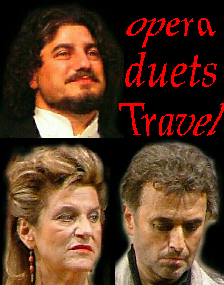
Dalila = Agnes Baltsa
Samson = Josep Carreras
Le Grand-Prêtre de Dagon = Giorgio Zancanaro
Abimélech = Guido Götzen
Un vieillard hébreu = Giuseppe Scorsin
Un messager philistin = David Corman
Premier philistin = Ruben Amoretti
Second philistin = Rolf Haunstein
Un enfant = Raphael Spiegel
Serge Baudo, conductor
Inszenierung - Grischa Asagaroff
Bühnenbild - Marouan Dib
Kostüme - An Skalicky
Lichtgestaltung' - Robertus Cremer
Chor - Jürg Hämmerli
Choreographie - Bernd R. Bienert
A great Carreras, a fantastic Baltsa and a weak Zancanaro
The conductor was not good enough, he single-handedly ruined some good operatic moments. Too much stage management ruined some moments and too little made other moments indifferent.The chorus sang beautifully, but their acting was not good enough. Not much feeling in their singing. I don't think it was their fault at all.
Act 1
An unusual setting, the chorus was building something. The conductor's use of forte too early made this poignant moment something like a chorus practice. (Listen to Philips track 1 to understand how it should have been) [Wrong dynamics] Then the moment came - Samson arrived (Carreras); the conductor made this much more vocally demanding than it should have been, too slow and too fast. Carreras was almost suffocated by following the conductor. The response of the chorus was just simply following the conducting. They did not show any understanding for the moment (the fault of the stage manager.
Abimelech arrived, the effectiveness of his aria was drowned by the going-on acting. Too much happened outside. (I think Carreras had to go out to drink a little water, because he came on stage at the ending of the aria.)
The spiritual farce became a physical farce, because the Israelites were fighting the guards of Abimelech. Carreras acted well, but it became a scene of the chorus. Giorgio Zancanaro as the grand prêtre was too weak, especially in the aria of revenge against Samson - Weak. The old Hebrew - a beautiful moment At last came Baltsa (= Dalila) with the Philistine girls, singing, dancing _ (for the first time Samson & Dalila as it should be staged).Dalila was so beautiful, so sexy, Samson was so attracted to her. At last Carreras could use his beautiful voice, with no brutal interference from the conductor
Act 2 the dream act of Samson & Dalila.
Giorgio Zancanaro was still weak, but showed some signs of good acting. Agnes Baltsa was the great singing actress as always. José Carreras sang gloriously and acted his heart out as Samson. The sweetness of "Mon coeur s'ouvre à ta voix" was overwhelming. But after the arias, when Dalila was doubting Samson, the conducting was suddenly in a frenzy. Baltsa and Carreras had to sing so fast, running so fast. To my amazement they managed to act even at this frenzied tempo. How I admired them, also felt sorry for them, knowing that opera-stars can be so totally at the mercy of the conductor. They survived and relieved we could have over a twenty- minute break.
Act 3
Carreras was in everything the suffering Samson. Only one regret, the chorus was just singing (off stage) without showing any emotions. The Philistines sang the 'L'aube blanchet' in a very civilized way, the Bacchanal was just a ballet, not interesting or sexy. The Grand prêtre showed some strength, the true strength was Dalila. To see Carreras walk onto the stage was very emotional, the suffering of Samson got through to the audience. Every emotion was evident in his voice, beautiful and heartbreaking. When Samson received his strength from God, I felt something was happening in myself. So emotional was it. The actual falling of the curtain was an anti-climax. Nothing dramatic happened. The chorus was not frightened, and neither were we.
It was a fantastic evening!!!
First live Baltsa/Carreras for me!
This page was last updated: June 20, 2022
